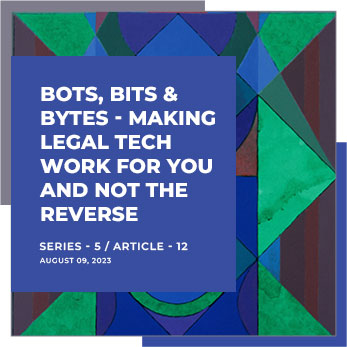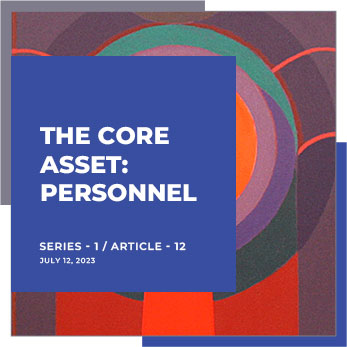“Conflicts of interest might disqualify an entire law firm from representing clients who are adverse to each other in unrelated matters. Proposed amendments to the California Rules of Professional Conduct would allow the use of an ethical wall in certain circumstances to avoid vicarious disqualification and allow representation of clients with conflicting interests in unrelated matters.”
As law firms grow and add additional practice areas, it is inevitable that the potential for conflicts and the unintended disclosure of confidential client information will become greater.
To avoid this serious ethics violation risk, a mechanism has been developed to preserve and protect the confidences and secrets of a client and to avoid conflicts of interest. That mechanism is known as an ‘ethical wall’ (also referred to as a ‘Chinese wall’), and lawyers and their staff are under a duty to build such walls. We will examine how to build ethical walls and the role that modern technology plays in achieving that goal.
Screening for Conflicts
An ethical wall is essentially a screening mechanism designed to protect a client from a conflict of interest by automatically preventing one or more lawyers within a firm from participating in any matter involving that client. The rationale behind the building of ethical walls is to prevent information obtained while representing a client from being disclosed to employees in the firm who represent other clients who may benefit from the information. Hence, the notion of a metaphorical ‘wall’ being created between the holders of information—lawyers or paralegals—and colleagues who represent interests that conflict.
How the Mechanics Work
Creation of an ethical wall is generally accomplished by prohibiting specific lawyers and paralegals from having any connection with a particular matter, and by banning discussions with prohibited individuals within the firm regarding that matter, and by educating all members of the firm about the separation of the lawyers and paralegals from that particular matter. The need for building ethical walls has become greater in the post-pandemic era, where there has been an increase in lateral hires which concomitantly increases the risk for attorneys carrying with them potential conflicts to their new firm.
A Special Risk for Paralegals
It is not just attorneys who are likely to bring with them the potential for conflicts when joining a new firm, but also paralegals. In fact, as more paralegals tend to become freelancers or ‘hired guns’ working for different firms at one time or for multiple firms within a short period of time, the issue of building ethical walls around them is particularly important. When a firm hires a new paralegal who formerly worked for opposing counsel or for the opposing client, the entire firm must be made aware that an ethical wall is to be erected around that paralegal.
Accordingly, no one in the firm may:
- discuss the case in the presence of the paralegal;
- allow the paralegal to access any documents related to the restricted information, including current or archival files; and
- engage in any discussions with the paralegal regarding prior work on the case or work that the paralegal’s previous firm may have provided. If such steps are not taken, then the firm risks disqualification from representing a client. Notably, paralegals themselves are not in a position to determine whether a potential conflict exists, and therefore, it is up to their supervising attorney to make that determination.
Types of Limitations
Ethical walls can operate in two different modes: in one case, default viewing parameters can be set for new matters coming in according to the attorney name or according to the code pertaining to the type of case. Another mode provides for viewing privileges set according to individual matter level. Although basic contact information is typically not restricted by ethical walls, such information as notes, documents, and even calendar events related to the matter will be screened. Users accessing ethical wall systems should be assigned passwords that have various levels of privilege.
Increased Court Scrutiny
The need for increased inquiry into and effective implementation of a firm’s ethical walls was recently underscored by the federal court. In United States v. Glenmark Pharmaceuticals, USA, 2:20 CR 00200 (RBS) (E.D.P.A.), a DOJ antitrust price-fixing prosecution against Glenmark and Teva Pharmaceuticals, the DOJ asked the court to assess the adequacy of ethical walls that the law firm of Morgan, Lewis & Bockius put in place as a result of its current representation of Glenmark and prior representation of Teva in the criminal matter, as well as its current representation of both companies in parallel civil cases. As part of its assessment, the DOJ requested that Morgan Lewis submit written answers to over 40 questions about the details of its internal ethical wall procedures, including how it staffs and manages its ethical walls in light of Pennsylvania ethical rules and how it was handling the issue of fee-sharing between attorneys working on both matters.
The government also requested that Glenmark and Teva answer similar sets of questions regarding their understanding of the procedures, including whether each company had consulted with independent counsel. This extensive inquiry, especially the questions directed to Morgan Lewis concerning its own internal procedures for implementing ethical walls, went beyond the typical Curcio hearing procedure and signaled that firms might have to implement stricter procedures in certain cases to assure the government and courts of their ability to follow ethical rules.
The Technology that Exists
Like many regulatory encumbrances, building ethical walls at first seems like it would pose an almost insurmountable burden on law firms. However, as with many solutions to today’s seemingly oppressive practice requirements, the answer lies with innovative technology. One such aid is Intapp, a Palo Alto, California developer of Walls 7.0., a leading services industry solution enabling compliance with confidentiality requirements. Intapp serves FINTECH organizations as well as law firms and claims to provide market-leading performance enhancements to support closed security models. Other similar providers of ethical walls systems include Workplace Security Manager and AGAT, a partner of Microsoft, Cisco, and other technology providers.
Although our modern world has as a cornerstone of progress the breaking down of barriers and tearing down of walls, when it comes to confidential client information, it seems that firms cannot build (ethical) walls fast enough.
Executive Summary
The Issue
How to build ethical walls in a law firm using modern technology?
The Gravamen
The risk of accidental or incidental disclosure of confidential client information is greater than ever, and to avoid this serious ethics violation, firms must take all available measures to put up barriers to the unwanted disclosure of such information.
The Path Forward
The technology exists to erect ethical walls around staff members and documentation that could otherwise lead to the disqualification of a law firm from handling the needs of a particular client or clients.
Action Items
Mind the Urgency:
No practitioners in a firm of any size should be under the misconception that ethical walls are only for Big Law firms with varied practice groups.
New Employee Scrutiny:
Whether the new employee coming on board is a lawyer or a paralegal, any staff members who have previously worked on other cases must be queried as to the potential for a conflict of interest.
People and Document Quarantines:
Once the need for building an ethical wall has been determined for a person and/or data, such measures must be strictly enforced, including the banning and of even casual discussions with prohibited individuals regarding the sequestered matter.
Deploy the Technology:
As adherence to ethical wall building becomes a matter of strict judicial scrutiny, law firms must utilize the latest technology that exists in order to avoid disqualification and possibly sanctions.
Further Readings
- https://definitions.uslegal.com/e/ethical-wall/
- https://www.lawinsider.com/clause/ethical-wall
- https://training.intapp.com/elearnings/walls-admin-essentials/
- https://bresslerriskblog.com/consulting-conflicts-ethical-walls-client-relationships-pitch-and-experience-management-regulatory-compliance/
- https://www.lawpracticetoday.org/article/ethical-walls-support-firm-growth-post-pandemic-economy/







